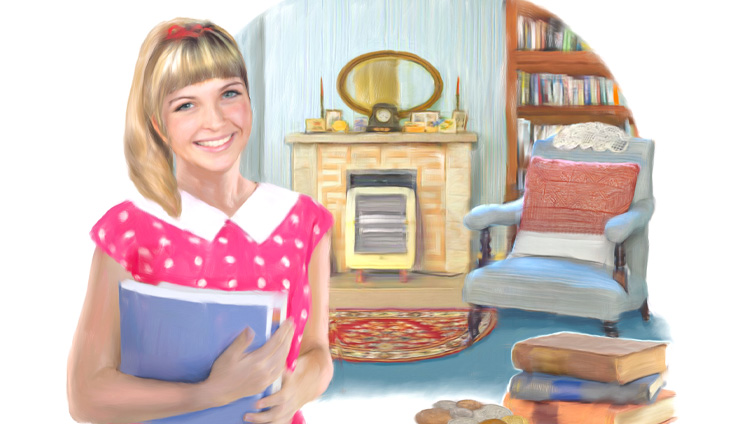Swept Away
It was almost as though I'd found myself in one of my employer's Victorian tales...

Illustration: Pat Gregory
Subscribe to The People’s Friend! Click here
It was almost as though I'd found myself in one of my employer's Victorian tales...

Illustration: Pat Gregory
HISTORICAL SHORT STORY BY ALISON WASSELL
In this story, set in the 1950s, It was almost as though I’d found myself in one of my employer’s Victorian tales…
I’M sorry, Jessie, but we need you bringing in a wage. Exams and college aren’t for the likes of us.”
I was almost fifteen, but it was all I could do to stop myself stamping my foot like a toddler having a temper tantrum.
It was so unfair. Most of the girls in my form at the grammar school took it for granted that they would go on to university.
As my birthday approached I had prayed that a miracle would occur to make Mum and Dad change their minds, but my prayers had not been answered.
I was to leave school as soon as I was old enough.
Mum gave me a letter to give to my headteacher, explaining the situation.
As I slid it into my satchel it occurred to me that all might not yet be lost.
Perhaps Mrs Dewberry would be so appalled at the thought of losing me that she would hurry round to the house and convince my parents that they were making a terrible mistake.
“It’s a pity, Jessica, but I know things have been hard for your family since your father’s accident.
“You need to do all you can to help out.”
I fought back tears. It had been a faint hope, and now even that was gone.
Perhaps if I had been like Doreen Perkins, top in every subject and captain of the hockey and netball teams, Mrs Dewberry would have been more inclined to fight my corner.
But the only thing I excelled at was English.
In maths, language and science subjects I struggled to keep up.
Maybe Mum was right, and I didn’t belong here. Mrs Dewberry held out her hand.
“You’re a hard worker, and that will stand you in good stead, whatever path you take. Good luck, my dear.”
Mum had done her best to make my birthday special.
She had made my favourite tea of Spam fritters and chips followed by tinned peaches with evaporated milk.
“Make a wish,” my brother Kenneth said as I blew out the candles on my cake.
There didn’t seem much point, now that all the things I might have wished for were unattainable, but I closed my eyes and pretended.
Mum presented me with a dress she had made herself.
It was more grown up than anything I had ever owned before, and if my heart hadn’t been so heavy I would have been delighted.
“Thanks, Mum,” I said, my voice little louder than a whisper.
“You might look a little more grateful, after your mother’s gone to so much trouble,” Dad barked.
He had changed since losing the use of his arm when it had got caught in machinery at the factory where he had worked.
Where once he had been cheerful and full of fun he was now quiet and short-tempered, and we all tiptoed around him.
Mum and Kenneth both seemed to be holding their breath, waiting for my response.
I longed to push back my chair and storm out of the room, but of course, I didn’t.
“I love it, Mum, honestly. It’ll be just the thing when I start work.” I kissed her cheek.
Kenneth snorted.
“Isn’t it a bit fancy for a machinist at Rimmers?” he said.
I glared at him.
There was no way I was going to work at Rimmers, the sewing factory where Mum was a supervisor, even though they were taking people on, and she had already put in a good word for me.
But this wasn’t the time to say so.
Sticking out my tongue at my annoying younger brother, I went to get a knife from the kitchen drawer to cut my cake.
I couldn’t sleep.
Creeping downstairs in my dressing-gown, I opened the back door and looked up at the night sky, feeling very small and insignificant.
After a few minutes I heard footsteps behind me, and Dad placed his good arm gently around my shoulders.
“I’m sorry, pet. I know things haven’t worked out the way you wanted,” he said.
I didn’t reply but rested my head on his shoulder.
“I blame myself,” he went on. “If it hadn’t been for that stupid accident you might have been able to stay on.”
I could hardly bear the sadness in his voice.
“Don’t worry, Dad,” I said. “I’m determined to make the best of things.”
Mum gave me a week to find myself a job.
Otherwise, she would speak to her bosses at Rimmers.
The trouble was, I had never known what it was I wanted to do.
I had fantasised about going away to college but had only a vague idea about what went on there. I just knew that I wanted to do something with books.
“I’ll go and ask if there are any jobs at the library,” I said.
Mum told me not to get my hopes up, but she let me have a new pair of stockings she had been saving and lent me a pair of shoes with small heels and her old handbag.
In my new dress I felt adult and sophisticated.
It took one look from the lady on the counter at the library to tell me I looked like a little girl in dressing-up clothes.
“There are no vacancies at present,” she said, clearly trying not to laugh at the posh voice I had put on to enquire.
“And when there are, we tend to take on people who are a little more mature.”
Mortified, I scurried away.
The library was my favourite place, but I feared I would be too embarrassed ever to set foot in there again.
“Why don’t you ask at the newsagent’s?” Kenneth asked, half joking, that evening. “At least you’d have magazines to read.”
It wasn’t such a bad idea. The following day I set off, this time dressed in a sensible skirt and jumper with my hair in a ponytail.
Afraid of making a fool of myself again, I lingered nervously outside the shop, waiting until all the customers had gone.
A card in the window caught my eye.
Assistant wanted for lady author. Must have good spelling and grammar. Please apply in writing.
Surely this was meant for me.
Forgetting all about the newsagent’s, I memorised the address on the card and rushed home to write my application.
I decided not to tell Mum and Dad until I had some proper news.
In my best handwriting, I described myself.
I am mature for my years and have won many prizes for my compositions.
I look forward to hearing from you at your earliest convenience.
Not wanting to arouse Mum’s curiosity by asking for a stamp, I decided to deliver the letter by hand.
I found the house easily enough.
While it was much grander than where I lived, it did not look like the home of an author.
In my imagination, writers lived in mansions and spent their days reclining on chaise longues thinking up their stories and being waited on hand and foot, not in 1930s semi-detached houses.
Undeterred, I popped the envelope through the letter-box.
“Who would need to write to you?” Mum asked two days later, as I opened a letter from a Mrs Agnes Potter, summoning me for an interview.
“Oh, just an old friend,” I said, trying to sound casual, although my burning cheeks must have made her suspicious.
I had never lied to her before and felt terrible about it, but I knew she wouldn’t approve of me visiting a stranger’s house.
When she opened her front door to me, Mrs Agnes Potter was wearing a disappointingly ordinary twinset and looked not unlike Gran.
“Come in, my dear. The kettle’s on the hob. We’ll have a nice cup of tea while we chat.”
The room she led me into was cosy and cluttered, its walls lined with bookcases.
While she went to make the tea I scanned the shelves, looking for books with her name on the spine.
Again, I was disappointed.
As we chatted, I found myself warming to my potential employer.
She seemed genuinely interested in me, and sympathised when I told her about having to leave school.
“I could tell from your letter that grammar and spelling are no problem for you,” she said. “I think you’re just the person I’m looking for.”
She took me into another room, which she called her study.
On the desk sat a typewriter. I had never used one, but decided not to mention it.
“This is where all the hard work will be done,” Mrs Potter said.
We agreed that I would start on Monday.
“You’re going to be a maid!” Kenneth said, when I mentioned that the job would also involve light domestic duties.
Mum leapt to my defence.
She had heard of Agnes Potter, whose late husband had been in charge of the accounts department at Rimmers, and was happy for me to take the job.
“There’s no shame in cleaning work,” she said. “I’m proud of you, our Jessie, for taking matters into your own hands.”
At nine o’clock on Monday morning, feeling both nervous and excited, I knocked on Mrs Potter’s front door.
It was opened, not by my employer, but by a younger woman with a stern expression who looked me up and down and did not seem impressed by what she saw.
“You’re younger than I’d have liked,” she said, leading me to the kitchen and handing me a list of instructions.
“I’ll be back this afternoon to check that your work is satisfactory,” she promised, putting on a smart coat and gloves and nodding curtly.
“My daughter Dorothy can be a little brusque. You’ll soon get used to her.” Mrs Potter had appeared in her dressing-gown and slippers as soon as the front door had banged shut.
We agreed that I would spend the morning completing the chores on my list, leaving the afternoon free for “literary pursuits”.
People sometimes described me as having my head in the clouds, but I had never been afraid of hard work.
In no time the kitchen was spick and span, with the taps polished until they sparkled, and the floor mopped.
As Mum had taught me, I made sure I got right into all the corners.
The cluttered lounge presented more of a challenge.
I was afraid to disturb the teetering piles of books and magazines that occupied every surface. They made dusting problematic.
Just do your best, dear. I prefer a room to look lived in
Mrs Potter said before retiring to the study to “do some daydreaming”.
I made the piles look a bit neater, dusted around them and straightened the antimacassars on the armchairs before turning my attention to the floor.
Keen to do a thorough job, I moved the hearth rug to sweep beneath it.
Given the general untidiness of the room, I wasn’t surprised to find a handful of coins lying there.
I gathered them up, stacked them carefully on the mantelpiece and forgot all about them.
I expected to have to prepare lunch, but Mrs Potter, declaring that she wasn’t completely useless, despite what Dorothy thought, insisted on making sandwiches, which we ate with a pot of tea and slices of home-made fruitcake.
When I had done the washing up, she clapped her hands.
“Right, it’s time to get down to some real work.”
I had been fretting that I would be expected to type while Mrs Potter dictated, and nervously confessed my lack of proficiency.
It turned out not to be a problem.
“Just get it all down in the notebooks,” she said. “We’ll worry about typing later.”
I was enjoying my new job more by the minute.
“How many books have you written, Mrs Potter?” I asked when, after more than two hours, we finally took a break.
My fingers ached from writing so fast, and my brain felt as though it was about to explode.
Mrs Potter had spent the whole time with her eyes closed, creating a wonderful tale of Victorian parlour maid Annie and her ne’er-do-well sweetheart which seemed set to fill many exercise books.
It was her turn to look embarrassed.
“To tell the truth, Jessie, I haven’t written any. I’ve been making up stories since I was a little girl.
“Dorothy says I’m a silly old woman, getting you to help me write them down, but I never had much schooling myself.
“My father always said girls had no need for what he called ‘book learning’.”
I smiled wryly at this. In Mrs Potter, it seemed, I had found a kindred spirit.
“Her story is brilliant, Mum. I’m sure she’ll be famous one day.
“And when her daughter came back she couldn’t find fault with my cleaning. She just grunted and said it all seemed satisfactory.”
It was then I remembered the coins under the rug. Mum looked thoughtful.
“That’ll probably have been to check that you’re doing your job properly, sweeping under the rug, and that you’re honest.
“I remember the lady I worked for doing something similar when I was a girl.”
I felt a bit crushed and hurt that Mrs Potter might think I couldn’t be trusted.
“From what you’ve said, it was probably the daughter,” Mum reasoned.
“Besides, you passed both tests, so you’ve got nothing to worry about.”
Realising that she was right, I pushed the incident to the back of my mind.
The next morning there was another list of tasks, although Miss Potter wasn’t there, which was a relief.
My first job was to turn the mattress on the single bed in the guest bedroom and put on clean sheets.
Sheets in airing cupboard on landing, the note said.
I found them easily, but my heart sank when I removed them from the top of the pile and discovered five more coins. I slammed the cupboard door.
“You don’t seem your usual cheerful self today,” Mrs Potter said over our lunchtime sandwich.
I smiled and assured her that everything was fine and, by the end of the afternoon, I was convinced that it was.
Mrs Potter was really getting into her stride, and I was so absorbed in the twists and turns of the story that sometimes I almost forgot that I was supposed to be writing it down.
Despite the business with the coins, I knew I had fallen on my feet.
How many girls of my age got paid to do something they loved?
Before I knew it, it was Friday. Mrs Potter said the house was looking tidier than it had for years and I had filled three exercise books.
Best of all, there had been no more visits from the fearsome Dorothy, although she continued to provide me with a daily list.
Today I was to concentrate on the kitchen and lounge again.
I hummed to myself as I worked, looking forward to the afternoon, when I hoped to discover whether or not Annie would defy her parents and marry her sweetheart.
Then my happiness was abruptly shattered.
Under the rug, yet again, lay five silver coins.
It was too much. Shaking with anger, I gathered them up, not sure what to do with them, but knowing I couldn’t bear being suspected like this a moment longer.
On the sideboard there was a fruit bowl filled, not with apples and oranges, but with what Mum would have called bits and bobs.
My eyes settled on a tube of glue.
Without pausing to consider the consequences, I glued the coins to the mantlepiece.
On the back of an envelope, I scribbled a note: These coins keep falling on to the floor.
In the kitchen I could hear Mrs Potter filling the kettle.
“I’m sorry, I need to go home,” I called, taking flight before she had time to reply.
I ran all the way home.
Dad was there alone, trying to mend a broken chair with his good hand.
“Lass, whatever’s the matter?” he exclaimed when he saw my tear-stained face.
I told him the whole story.
“Well, you’ll need to pay for any damage to the mantelpiece, but I can see why you did it.”
The fact that Dad was being so understanding made me even more tearful.
“I can never go back there,” I wailed.
He said something about needing to face the music and I fled upstairs to fling myself dramatically on my bed, just like a character in Mrs Potter’s story.
All the excitement must have worn me out. I fell asleep and was woken by Dad calling me.
“Jessie, there’s someone here to see you.”
I went down to find Dorothy Potter, in a smart suit, looking out of place in our homely kitchen.
Her cheeks were flushed.
“Mother has given me a dressing down,” she said with a nervous laugh. “I hope you’ll accept my apology.”
I must have looked foolish, standing there with my mouth open, utterly lost for words.
Dad, behind me, whispered that I was forgetting my manners and, not knowing what else to do, I offered her a cup of tea, which she politely declined.
She sat down at the table, thankfully not on the wobbly chair Dad had been working on.
“In my own foolish way, I was trying to protect Mother. She always thinks the best of people, while I’m quite the opposite.
“I was afraid she would be taken advantage of, but I should have trusted her judgement.
“She’s furious with me, and she has every right to be, as do you.”
I continued to stare, unable to believe what I was hearing.
“Our Jessie will be there bright and early on Monday morning, now this misunderstanding has been sorted out,” Dad said.
Mrs Potter had baked some shortbread to celebrate my return.
“I must admit, I had a little chuckle to myself, afterwards,” she said. “It’s just the kind of thing Annie might have done.
“In fact, I’m going to include it in my story.”
I smiled.
“I’d better get on,” I began, “but there’s just one thing . . .”
Mrs Potter looked up at me.
“I think you need to buy a lot more exercise books,” I said.
Never miss an issue ‘The People’s Friend’ packed with even more stories on sale every Wednesday.

Paula Williams

Deborah Siepmann


Alison Carter


Teresa Ashby

Beth Watson

Alyson Hilbourne

Katie Ashmore

Kate Hogan

Liz Filleul

Beth Watson